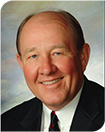
Missouri Needs a Dose of Collaboration to Cure Health Care Ills
In more than four decades in the health care industry, I have never encountered systemic symptoms as serious as those that face us today. Rapidly rising costs, the inability of employers to insure employees, and the growing number of aged and uninsured patients make up a malady that threatens to disable Missouri and the nation.
The solution will require new levels of collaboration among health care providers and business and education leaders. Ultimately, the two key determinants of health status are education level and job quality. In order for the United States to thrive and compete in the global economy, we must create a healthier, better educated work force and improve the efficiency and output of the American health care system.
In the mid-1990s, our not-for-profit Heartland Foundation, based in St. Joseph, began to venture into the community to enlist the help of educators and business leaders to improve the health status of citizens in northwest Missouri. We understood that the primary driver of poor health was lack of education and that you cannot separate a health care agenda from an education agenda.
In its locally driven efforts to improve public health, the foundation has been able to:
- Partner with the national Project Fit program to supply state-of-the-art fitness equipment, healthy lifestyles curriculum, and cardiovascular training to 43 area schools, serving more than 10,800 children.
- Bring educational and business communities together to discuss strategies to build a continuous learning process from preschool through graduate education.
- Conduct forums to build community consensus around key issues and opportunities for change.
- Partner with the National Center for Democracy to engage youth on issues of citizenship, democracy and public service.
Those projects reflect my belief that health and education start from day one. Eighty percent of brain development occurs before children enter kindergarten. A St. Joseph hospital invites staff from the Parents as Teachers program into its OB ward to let parents know how they can aid their babies’ development. It also partners actively with the local school district, too. The school superintendent and health care leaders share the belief that children have to be healthy to be ready to learn.
The three sectors of health, education and economic development are intertwined. But we have arrived at the current health care crisis by treating them as separate silos.
A current example is the shortage of health care workers in Missouri. As a member of the Coordinating Board for Higher Education for more than six years, I supported an initiative called Caring for Missourians to educate more health care professionals. The General Assembly approved one-time funding for that program this year. If fully implemented, it would have an economic impact of well over $53 million per year while providing nurses, therapists, pharmacists and other professionals that will be desperately needed by our aging population.
CBHE also works closely with the P-20 Council, a group created by the legislature and composed of the directors of higher education, economic development, and elementary and secondary education to address the continuum of education and its importance to economic development.
Both these efforts dismantle those silos to address mutual problems and create a better quality of life for Missouri residents. A healthy society is about keeping things in balance. You need education and health to be productive, and by working together we can achieve prosperity.
The quality of health care provided here may be the best in the world, but the U.S. ranks 37th among developed nations in the overall health status of our citizens.
Health care, like education, defense and transportation, exists to serve the public interest and should be driven by the needs of our citizens.
Our experience in northwest Missouri shows that education improves the health of the community. Just as doctors alone can’t cure an epidemic, it will take leaders in health care, education and business working together to address the declining health status of our citizens and our ability to care for them. ![]()
Lowell Kruse
is the President of Heartland Health
P | 816.271.6554
E | Edie.Everly@Heartland-Health.com